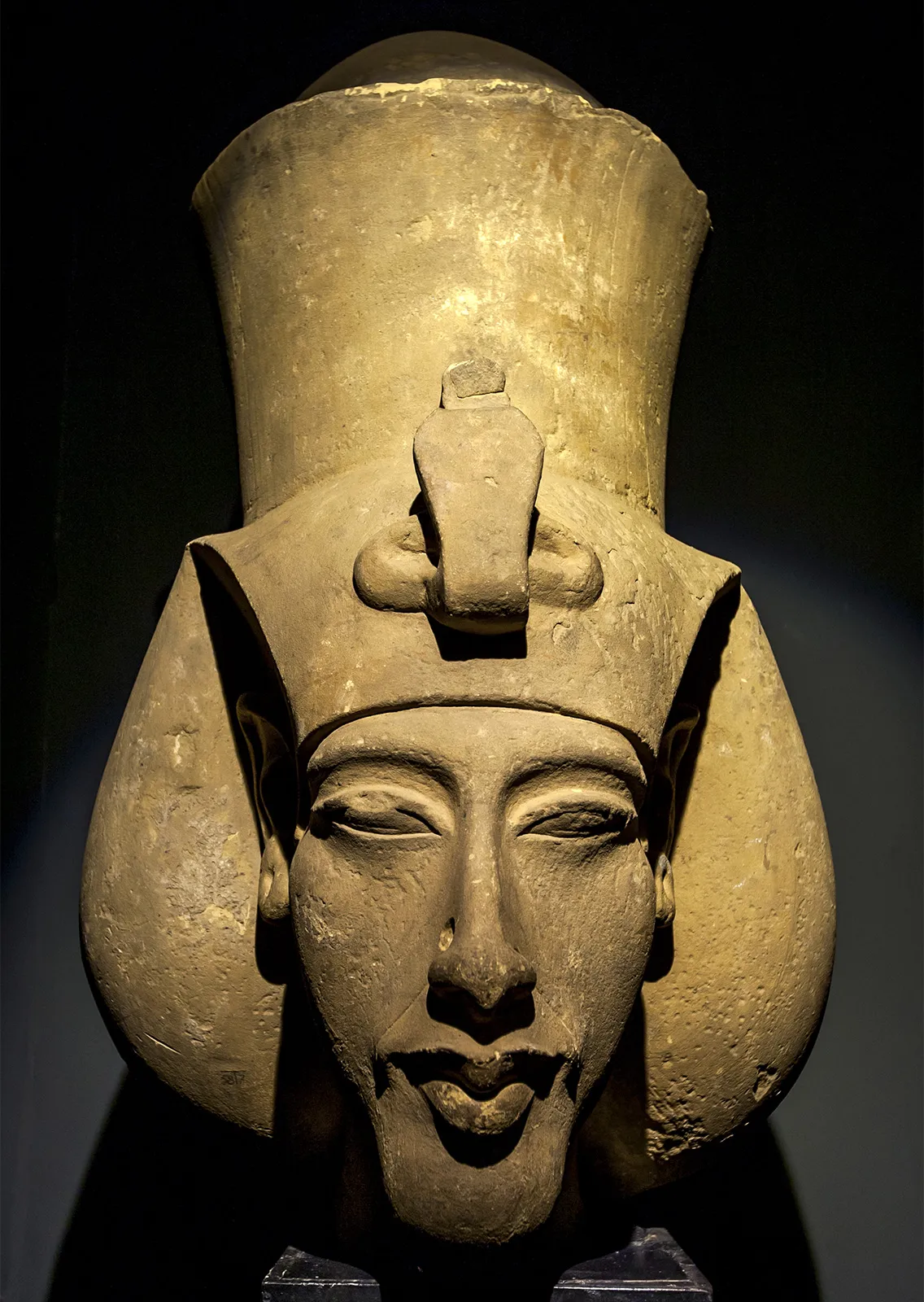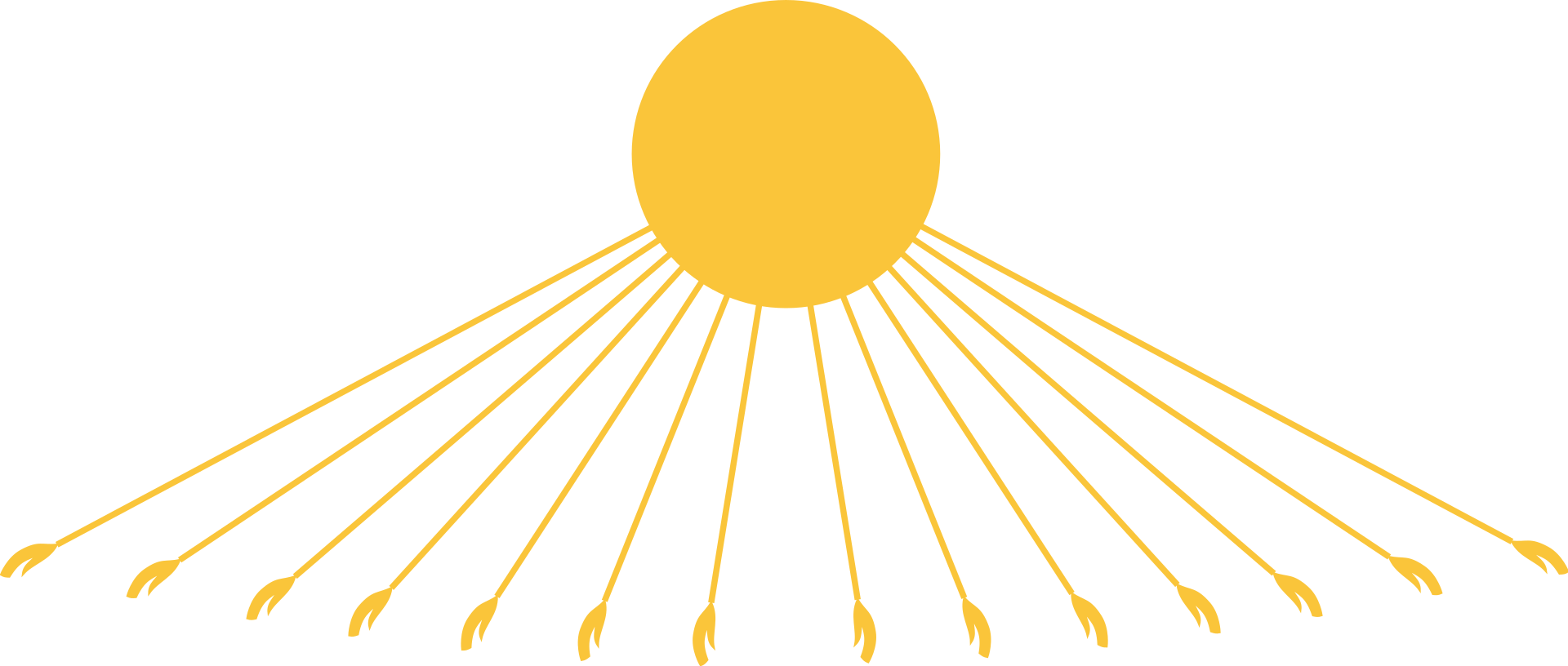
This is Pharaoh Amenhotep IV, who renamed himself Akhenaten. In every surviving representation of him he is immediately recognizable; no one else looks like him. There is good reason to believe that he instructed his artists to portray him in a certain manner, a manner especially evident in full-length portrayals:

He always bears the same features: a high-cheekboned face with slanting eyes and full lips; a narrow waist; a bit of a pot-belly; wide, feminine hips; full thighs and spindly calves. It’s hard to imagine why he asked to be portrayed in this way unless this is, to some degree anyway, what he actually looked like, but some scholars — for instance, Jacobs Van Dijk here — have noted that the artwork that survives from his reign portrays all people in a similar way, though no such mode of representation preceded this era. It is as though Akhenaten decreed himself the image of humanity. It can’t be accidental that he looks like a pregnant woman, like someone about to give birth to something.
His wife, Nefertiti, gave birth to at least six daughters, but what he gave birth to was the most radical religious reformation ever undertaken: the elimination of the entire vast system of Egyptian worship and the replacement of every cult of every god with a single cult: that of the Aten, the disc (or globe) of the sun. The Egyptians already had a sun-god, of course, Ra, or Amun-Ra, who looked like this:

Sometimes (after he was in some sense united with the sun-god Ra) he has a falcon’s head. But Aten looked like this:

The refusal of human or animal imagery was very much the point, though I guess the Aten in a way has hands: like the Beatles, it has arms enough to hold you.
Akhenaten of course doesn’t mean to suggest that this is what the only God actually looks like: it is merely a visual representation of universality. The idea that a god “looks like” anything, even metaphorically, is part of what he wants to overcome. The great Egyptologist Sir Flinders Petrie wrote of this new theology,
If this were a new religion, invented to satisfy our modern scientific conceptions, we could not find a flaw in the correctness of this view of the energy of the solar system. How much Akhenaten understood, we cannot say, but he certainly bounded forward in his views and symbolism to a position which we cannot logically improve upon at the present day. Not a rag of superstition or of falsity can be found clinging to this new worship evolved out of the old Aton of Heliopolis, the sole Lord of the universe.
On the other hand, a later Egyptologist, Sir Alan Gardiner, in his classic Egypt of the Pharaohs, has a terser description of Akhenaten: he calls him a “heretic.”
The wonderful idea at the center of Joseph and His Brothers is this: Akhenaten is the Pharaoh who made Joseph his vizier. And thus the thematic tension between monotheism and polytheism is heightened — for, when these two men meet, who is more of a monotheist?
Mann is of course neither the first nor the last to speculate on the possible relationship between Akhenaten’s monotheism and that of Israel. I am not sure, but I believe that the American archaeologist James Henry Breasted was the first scholar to note the relationship between Akhenaten’s Great Hymn to the Aten and (for instance) Psalm 104. Speculation has usually focused on the possible influence of Egypt on the Israelites, in part because the Israelites were a dependent and then an enslaved people, but also in part because the tradition of seeing Egypt as the source of religious ideas for the rest of the world goes all the way back to Herodotus (see the Histories, Book II ¶ 50ff).
This is how Freud thought of the matter, in Moses and Monotheism, which presents us with Moses as an Egyptian adherent of Atenism. (It’s an incoherent book, alas — written as Freud was dying and little more than a confused riff on Breasted’s work.) This is also how C. S. Lewis thought of the matter. In his Reflections on the Psalms — written twenty years after Freud’s book, which Lewis may or may not have known — he wrote of Akhenaten’s revolution,
As we can see, it was a total failure. Akhenaten’s religion died with him. Nothing, apparently, came of it.
Unless of course, as is just possible, Judaism itself partly came of it. It is conceivable that ideas derived from Akhenaten’s system formed part of that Egyptian ‘Wisdom’ in which Moses was bred. There is nothing to disquiet us in such a possibility. Whatever was true in Akhenaten’s creed came to him, in some mode or other, as all truth comes to all men, from God. There is no reason why traditions descending from Akhenaten should not have been among the instruments which God used in making Himself known to Moses. But we have no evidence that this is what actually happened. Nor do we know how fit Akhenatenism would really have been to serve as an instrument for this purpose.
Lewis’s thoughts on Akhenaten are interesting enough that I may have to return to them in another post. But for now I just want to note that his way of considering the relationship (which is also the archaeologists’ way) is not the only possibility. What if the flow of influence were reversed? What if one son of Israel, having risen to the position of Pharaoh’s vizier, had the eloquence and imagination to plant the monotheistic seed? — to plant it in fertile and ready ground, to be sure, but to plant it nonetheless. That is the possibility that Mann invites us to consider.
And perhaps he reminds us also of another point, not a possibility but a reality. Akhenaten’s revolution failed utterly: his son Tutankhaten removed the Aten from his name and became Tutankhamun, affirming his loyalty to one of the gods his father had attempted to banish, Amun-Ra. Of course, ultimately all the gods of Egypt failed; but the children of Israel thrived, and despite countless setbacks, persecutions, and pogroms, despite living for centuries among people who have wanted and still want to destroy them altogether, still to this day worship the God of their fathers, the God of Abraham, Isaac, and Jacob.